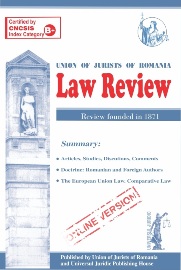EU ETD: Towards a New Chapter in EU Citizens’ Rights and a Better Administrative Cooperation
EU ETD: Towards a New Chapter in EU Citizens’ Rights and a Better Administrative Cooperation
Author(s): Erzsébet CsatlósSubject(s): Law, Constitution, Jurisprudence, Civil Law, Public Law, EU-Accession / EU-DEvelopment, EU-Legislation
Published by: Universul Juridic
Keywords: human fundamental rights; European integration; Declaration on European Identity 1973; European Union Public Law;
Summary/Abstract: The concept of a ‘People’s Europe’ first referred to benefits of traders and at the beginning of the economic integration the protection and rights under the same condition was already envisaged by the founders (EEC Treaty 1957, art 220). Later, step by step, the European integration has expanded its scope to different policies, and rights of the people was revaluated along with the concept of European identity. (Declaration on European Identity 1973, I; Checkel and PJ Katzenstein 2009, pp. 11-14) The cosmopolitan conception was first manifested in the European citizenship officially created by the Maastricht Treaty to confer rights to citizens of the Member States of the EU and established legal basis to create the necessary normative background for them. Maastricht Treaty 1992, art. 8 1.; 8c) Among these rights, the most challenging one was the right that enabled European Union (EU) citizens to turn to any foreign representation of any Member States for help in third States in case if their State of nationality is not represented there. At first glance, it seems that the adjectives ‘diplomatic’ and ‘consular’ are used as synonyms in the referred treaty provisions, although diplomatic protection and consular protection are two completely different legal concepts. Given the fact that consular function can also be practiced by both diplomatic and consular agents (VCCR art. 70) and considering the content of secondary sources that aim to give a substance to them, it becomes obvious that the European citizenship policy currently rather ensures consular protection and assistance. (Schiffner 2009, pp. 535–543; Vigni 2011, p. 100; Battini 2011, pp. 177– 178; Becánics 2015; pp. 25–26, cf. C- 293/95, point 43-45 and Vigni 2010, p. 17)
Journal: Law Review
- Issue Year: 2019
- Issue No: 02
- Page Range: 60-81
- Page Count: 22
- Language: English
- Content File-PDF

